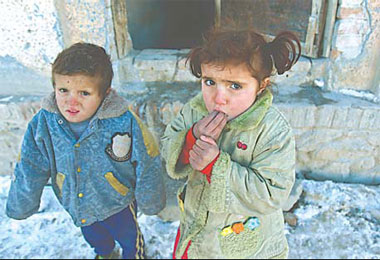Strategies that can help reduce the number of children who die before their fifth birthday were highlighted at the release of UNICEF report, "The State of the World's Children 2008: Child Survival", in Geneva yesterday.
Though recent data show under-five mortality rate has fallen, the report goes beyond the numbers to suggest actions and initiatives for further progress.
World Health Organization's (WHO) China representative Hans Anders Troedsson summarizes the report in four key points: "It is progress. We've seen progress. And we see a reduction in children's death across the world. But it is not enough. We still have too many children dying every year - 9.7 million. It's a staggering figure.
Displaced Afghan children stand in the cold in front of an abandoned building, which is their home in Kabul. Cold weather and heavy snow has exposed children to avoidable diseases and killed more than 100 people and over 35,000 heads of cattle across Afghanistan this month alone. Reuters
"We could prevent the majority of deaths, but we just let them happen. It is unacceptable. We have the knowledge and power to prevent and save at least two-thirds of these 9.7 million children. It's time to turn this knowledge into real action. We need to put resources to prevent the deaths of both mothers and children."
How can we do that? "Community-level integration of essential services for mothers, newborns and young children, and sustainable improvements in national health systems can save the lives of many of the more than 26,000 children under five who die each day," says UNICEF Executive Director Ann M. Veneman.
"The report describes the impact of simple, affordable life-saving measures, such as exclusive breastfeeding, immunization, insecticide-treated bed nets and vitamin A supplementation, all of which have helped reduce child deaths in recent years," Veneman says.
An analysis of the report shows that far more needs to be done to increase access to treatments and means of prevention to reduce the devastating impact of pneumonia, diarrhea, malaria, severe acute malnutrition and HIV. The challenge is to ensure children have access to a continuum of healthcare, backed by strong national health systems.
More money has to be spent on health systems "if we are to meet the child health targets set by the UN", says WHO Director-General Margaret Chan. "Innovative programs in many countries show that an integrated approach where each child is reached with a package of interventions at one time can bring immediate benefits."
New information in the UNICEF report has been drawn from household survey data, as well as material from key partners, including WHO and the World Bank. It provides examples of successful initiatives, such as the Accelerated Child Survival and Development Initiative, which provides integrated primary care to impoverished households in sub-Saharan Africa, and the Measles Initiative - a global campaign that has helped reduce measles deaths by about 68 percent worldwide, and by more than 90 per cent in Africa, since 2000.
The approach to child survival that the report advocates would see the best disease-specific initiatives combined with spending on strong national health systems to create a continuum of care for mothers, newborns and young children that extends from home to the local clinic to the district hospital and beyond.
The report emphasizes the need to involve local communities that generate the necessary demand for quality healthcare. Their engagement is vital if marginalized and remote populations are to be reached.
Nowhere is the need for life-saving strategies more apparent than in sub-Saharan Africa where, on an average, two in every 12 children die before their fifth birthday. In 2006, almost half of all under-five deaths occurred in sub-Saharan Africa, even though less than a quarter of the world's children live there.
The report provides information on a strategic framework developed by UNICEF, WHO and the World Bank - at the invitation of the African Union - to help African and other countries reduce the number of mother and child deaths. The framework calls for:
Good data to inform of policies and programs;
A shift to combine disease-specific and nutrition interventions in integrated packages to ensure a continuum of care;
The mainstreaming of maternal, newborn and child health and nutrition into national strategic planning processes to scale up and strengthen health systems;
Improved quality and increased, predictable financing for strengthening health systems;
Political commitments to approaches that provide a continuum of care; and
The harmonization of global health programs and partnerships.
"Child survival is not only a human rights imperative, it's also a development imperative," says World Bank's Human Development Network Vice-President Joy Phumaphi. "Spending on children's and their mothers' health is a sound economic decision and one of the surest ways for a country to set its course towards a better future."
(China Daily January 25, 2008)


